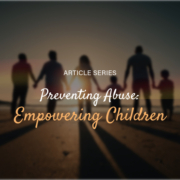Preventing Abuse: Empowering Children
Teaching children about child abuse prevention gives them the knowledge and skills they can use to protect themselves. Because the topic feels uncomfortable, it is often left untaught. Yet, we know that each child is a precious gift from God, a gift we must protect, even when it feels uncomfortable.
Teaching children about abuse can be a series of simple conversations reminding them they are God’s creation. When their sense of self-worth comes from being a child of God, they are less apt to seek approval from abusers.
We expect children to treat others with respect and dignity, and we need to reinforce that they should expect the same in return. Children do not have a position of power in their relationships with adults. This means they need opportunities to be heard by their youth leaders, even if they disagree. Abusers use the power differential to maintain control. By empowering children to disagree respectfully, we teach them that their voice deserves to be heard.
Some Bible lessons lend themselves to talking openly about abuse. Lot offered his daughters to the men of Sodom. This was wrong. He was offering to allow them to be abused. Use this as a starting point to talk about the sin of abuse. Ask children what else an adult should never do to a child. Let them know that you’d be happy to listen if they ever want to talk about something that has happened to them.
Lutheran elementary schools can teach about body autonomy and personal boundaries as part of science and other classes. Help children understand that their bodies belong to them and that they have the right to set personal boundaries. Teach them to trust their instincts if they feel something is wrong. Help them name trusted adults they can tell.
Children need education about grooming tactics used by abusers, such as manipulation, secrecy, bribes, or threats. Create roleplay opportunities. We talk to children about not accepting candy from a stranger, but we must practice saying no. We can do the same with an adult telling them to keep a secret or bribing them to do something they feel is not okay.
Teaching child abuse prevention is an ongoing process and requires a delicate balance. Adapt the principles to age-appropriate language and concepts, ensuring the focus remains on protecting children, promoting their well-being, and reflecting the love and compassion of Christ in all interactions.
Michelle Markgraf, Freedom for the Captives




